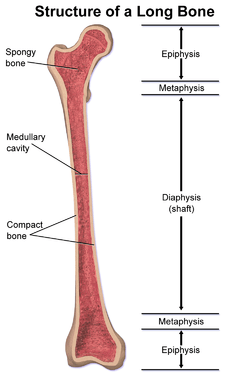Medullary cavity
The medullary cavity (medulla, innermost part) is the central cavity of bone shafts where red bone marrow and/or yellow bone marrow (adipose tissue) is stored; hence, the medullary cavity is also known as the marrow cavity. Located in the main shaft of a long bone (diaphysis) (consisting mostly of compact bone), the medullary cavity has walls composed of spongy bone (cancellous bone) and is lined with a thin, vascular membrane (endosteum). However, the medullary cavity is the area inside any bone (long, flat, etc.) that holds the bone marrow.[1]
| Medullary Cavity | |
|---|---|
 A long bone, with medullary cavity labeled near center. | |
| Details | |
| Identifiers | |
| Latin | cavitas medullaris |
| TA | A02.0.00.037 |
| FMA | 83698 |
| Anatomical terminology | |
This area is involved in the formation of red blood cells and white blood cells, and the calcium supply for bird eggshells. The area has been detected in fossil bones despite the fossilization process.[2]
Intramedullary is a medical term meaning the inside of a bone. Examples include intramedullary rods used to treat bone fractures in orthopedic surgery and intramedullary tumors occurring in some forms of cancer or benign tumors such as an enchondroma.
References
- Martini, F.; Nath, J. L. (2009). Fundamentals of Anatomy and Physiology (8th ed.). San Francisco, CA: Pearson Education. ISBN 978-0-321-50589-7.
- Peterson, J. E.; Lenczewski, M. E.; Reed, P. S. (October 2010). Stepanova, Anna (ed.). "Influence of Microbial Biofilms on the Preservation of Primary Soft Tissue in Fossil and Extant Archosaurs". PLoS ONE. 5 (10): 13A. doi:10.1371/journal.pone.0013334. PMC 2953520. PMID 20967227.